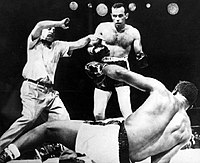
Back ضربة قاضية Arabic Nocaut AST Nokaut Azerbaijani Нокаут Bulgarian নকআউট Bengali/Bangla Knockout Catalan لێدانی تەکنیکی CKB Knockout Czech Нокаут CV Knockout Danish


A knockout (abbreviated to KO or K.O.) is a fight-ending, winning criterion in several full-contact combat sports, such as boxing, kickboxing, muay thai, mixed martial arts, karate, some forms of taekwondo and other sports involving striking, as well as fighting-based video games. A full knockout is considered any legal strike or combination thereof that renders an opponent unable to continue fighting.
The term is often associated with a sudden traumatic loss of consciousness caused by a physical blow. Single powerful blows to the head (particularly the jawline and temple) can produce a cerebral concussion or a carotid sinus reflex with syncope and cause a sudden, dramatic KO. Body blows, particularly the liver punch, can cause progressive, debilitating pain that can also result in a KO.
In boxing and kickboxing, a knockout is usually awarded when one participant falls to the canvas and is unable to rise to their feet within a specified period of time, typically because of exhaustion, pain, disorientation, or unconsciousness. For example, if a boxer is knocked down and is unable to continue the fight within a ten-second count, they are counted as having been knocked out and their opponent is awarded the KO victory.
In mixed martial arts (MMA) competitions, no time count is given after a knockdown, as the sport allows submission grappling as well as ground and pound. If a fighter loses consciousness ("goes limp") as a result of legal strikes, it is declared a KO.[1] Even if the fighter loses consciousness for a brief moment and wakes up again to continue to fight, the fight is stopped and a KO is declared.[2] As many MMA fights can take place on the mat rather than standing, it is possible to score a KO via ground and pound, a common victory for grapplers.
In fighting games such as Street Fighter and Tekken, a player scores a knockout by fully depleting the opponent's health bar, with the victor being awarded the round. The player who wins the most rounds, either by scoring the most knockouts or by having more vitality remaining when time expires during each round, wins the match. This differs from combat sports in reality, where a knockout ends the match immediately. However, some fighting games aim for a more realistic experience, with titles like Fight Night adhering to the rules of professional boxing, although technically they are classified as sports games, and share many of the same features as NFL and NBA video games.
- ^ "Rules and Regulations - Unified Rules and Other MMA Regulations". www.ufc.com. Archived from the original on 2016-04-16.
- ^ http://mixedmartialarts.com/mma-news/341856/Herb-Dean-The-fight-is-over-when-hes-unconscious[permanent dead link]
© MMXXIII Rich X Search. We shall prevail. All rights reserved. Rich X Search